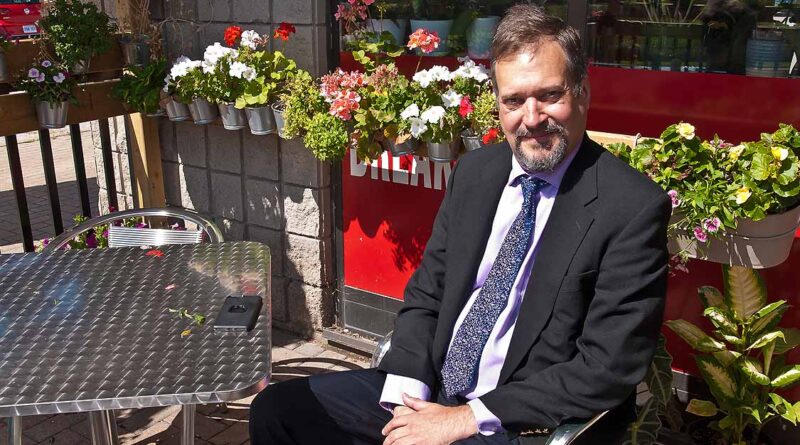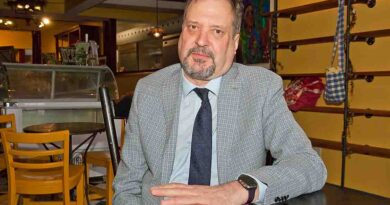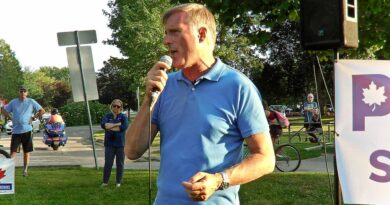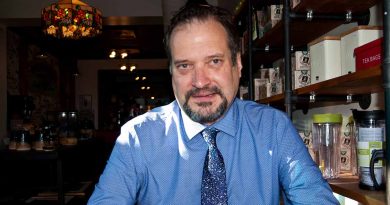Stephen Makk: Something For Everybody
SUNonline/Orillia profiles candidates from each party in the forthcoming federal election.
By John Swartz
Stephen Makk is the only candidate in the Simcoe North riding who has experience in an election campaign. He was the People’s Party of Canada candidate in the 2019 race. The experience made an impression.
“I found a passion I didn’t know I had in me. I can’t be on camera, but when there’s people there, I was such an introverted person even four years ago, something clicked. I love doing this. When I get people talking, even if they are not agreeing, I find an energy that’s coming from elsewhere. I’m a man on a mission and I love what I’m doing. When I ran in 2019 I made so many friends. I got to know Simcoe North, every corner of it,” Makk said.
Previously, Makk described himself as a Libertarian, but he’s expanded his definition of what it means.
“I think if you want to get technical, Classical Liberal. I do believe a man who has no clothes and has no money cannot be free. I do believe government can do good things. Libertarian in my general outlook, yes. If in doubt, do no harm and trust the people to use their freedom responsibly. That is part of our party slogan. But it’s also my personal philosophy,” he said.
One key thing attracted him to the PPC.
“We’re fighting for people’s freedoms. One place where we’re different is we put civil rights ahead of public health, ahead of being popular, ahead of staying the course on things. At the most recent rallies I’m meeting former Greens, former NDP and yes, even some former Liberals who are just disappointed in what the Liberal Party has become. Or Conservatives, what has the Conservative Party become? It’s not that conservative. It’s moving around, it’s moving towards the Liberals,” he said.
“Within the PPC I have been a bit of an oddball because I’ve been advocating that, no, we are not the special club for extra grouchy conservatives, we are much more. I’ve been talking with Max (party leader Maxime Bernier) from day one since we’ve started doing the tour together. I was discussing how I reach out to people of diverse views and I’m finding people are receiving the message well. Some of the demographics are really surprising. PPC support is more females than males right now. The other thing is by age, the younger the voter, the more likely they are to vote PPC. We’re starting to understand what the people want and what they are worried about. Because we are small government libertarian, we don’t have to change who we are to appeal. People are coming to us. I’m finding by not jumping on any particular issue of the day, I think we’re really gaining support.”
The party has gained points in pre-election polls, and Makk is noticing more engagement with voters in Simcoe North.
“It’s like riding a tornado. I was confident that the PPC message would work, but we completely underestimated the response,” he said. He was curious about picking up support from women. “I asked my supporters why so many women? Some of our volunteers said it’s the momma bear effect. A lot of women are really worried of their children. They’re worried about what’s going on. Kids are going to school and they’ve got to wear masks and the kids are being taught fear. Smaller kids have been going a year without really playing with other kids like they need to, to socialize properly. I think there’s an instinct kicking in and this is quiet and it’s a quite determined anger.”
A question put to all candidates is about how they educate themselves when faced with issues the public expects candidates, or MPs to know something about.
“I will avoid making an uninformed vote ever. I’m for the people of Simcoe North – and Canadians – first, then party second, leader third. I love my leader, I talk with him, he listens, I listen to him. He’s the right leader for our party. He can persuade me, but he’s not going to tell me how to vote. In Ottawa, I’d probably be spending more time in the library of parliament than most people. I would also use my budget to hire analysts to help research factual kinds of things. I do have a circle of trusted people I rely on for information.”
Makk lives in Victoria Harbour with wife Riina and they have two sons. He is an engineer and owns Makk Design Inc., making a variety of popular consumer electronic devices for major brands.
COVID
Anyone familiar with the ongoing news coverage knows the PPC is against mandating masks, vaccines and any more stay-at-home orders. What does Makk think of the government’s handling of the pandemic?
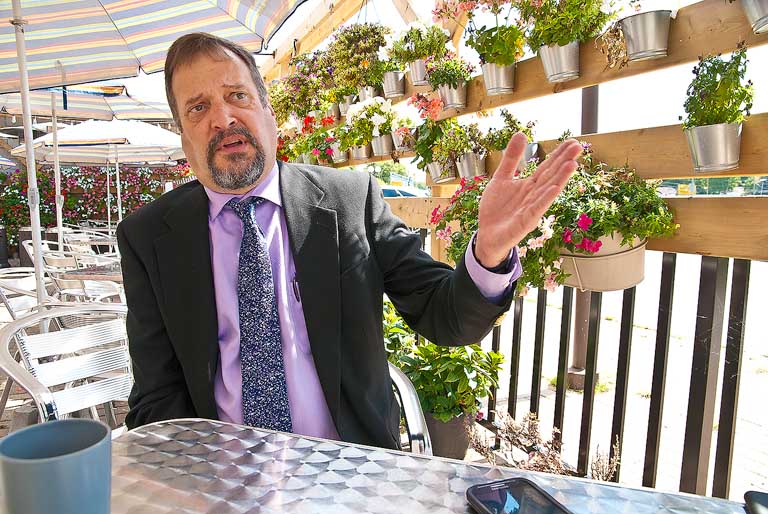
“When this thing started I said right away we’ve got to stop flights from China. Any thought of that was viewed by our government as kind of racist, or something. But China is a country, it’s almost a continent, it’s a culture and it’s kind of a group of genetic characteristics. I’m not afraid to talk about China and the Chinese people as a political reality. It’s not a good place. I’ve been there a lot. I know what I’m talking about. I was there when they were opening up in the 80s, I saw a lot of promise and a lot of promise squandered in the name of rampant capitalism of a sort. They should have closed it down first. They should not have made these deals with the Chinese so fast on the vaccines, that was embarrassing. I think they were too worried about possible racism that might happen instead of actual deaths and illnesses that was happening,” he said.
“I give everyone a break, when your facing the unknown you do your best and mistakes will be made, but you have to learn from your mistakes. Canada was slow on the uptake. I believe the problem generally is government procurement is not the most efficient thing on earth and it will never be as good as private procurement. So we got our vaccines late and they got the vaccines out and available to people reasonably quick.”
“My main dispute is not what they did in the past, but what they’re doing right now and planning to do in the immediate future. We essentially have this pandemic controlled, but the fear mongering goes on and they are using consciously, or unconsciously, possibly with good intentions, to now infringe our rights more. Why now? Why are we turning the screws at this point? If you look at the stats, Simcoe Muskoka Health Unit stats on deaths they attribute to COVID, we’ve had one in over a month. Deaths are a lagging indicator, I know. Hospitalizations are kind of flat, oh cases going up, but you know, the Delta variant, Corona viruses mutate, we all know that, that’s why there’s no cure for the common cold because they are slippery little guys and they evolve to be lower morbidity, more infectiousness.”
“Of course the numbers are going to go up, kids are going back to school, people are getting on with their lives. Let’s not panic, this normal, this is what happens. Like Maxime says, the chances of a reasonably healthy person without problems dying from this are extremely low.”
All that being said, Makk contracted COVID in the earliest stage of the pandemic.
“I had it December through February. I was hospitalized twice, once in Georgian Bay Hospital, for over a week, and once in Barrie. I went to a restaurant with my family thinking I was over it and I pretty well stopped being able o breath properly. The healthcare system deals with this pretty well. They didn’t know what it was. The doctors were a little bit baffled when I was in Georgian Bay, but they did everything right. They ruled out all the bacterial things. They knew it was a really bad pneumonia. One guy thought this guy’s got terminal cancer maybe. Both my lungs were full. I have damaged lungs now. I’m on a puffer. Now I have asthma, but I’m pretty well normal now. It takes about a year to recover.”
Despite what many think the party’s position on vaccines, masks and lockdowns is, Makk is more about people being able to make choices rather than being told what to do.
“I’m not an anti-vaxxer, people think I am. I’m not against masks. In some cases even lockdowns might make sense, although general broad-brush stuff is absolutely wrong and we are not getting any good data from our government. They don’t seem to spend a lot of time providing a rationale. They’ll say vaccines are safe. What if you are not trustful of the government? How safe? Compared to what? I believe vaccines are not 100% effective. They’re effective. They are not 100% safe either. There are reactions, there are side effects, there are possible complications, but don’t say 100% blanket statements. How well did we do in lockdowns compared to places that didn’t? The data there is kind of mixed,” Makk said.
The euphemistically called vaccine passports are another issue he, or the party, does not like. But, does it not make sense people who are healthy should have the ability to know others they come in contact with have been vaccinated and are wearing masks (which studies have shown to be the most effective way to stop transmission) in public places is good policy? After all, each of us has had a vaccine record since childhood which will reveal to authorities whether we get to take part in some institutional activities, or travel to certain places.
“But you didn’t have to show it at a restaurant. I don’t need to talk about whether I have HIV, or not, going to Canadian Tire. I can think of all kinds of absurd examples. People should get vaccinated. If they don’t, it’s their body. The power of the state ends at your skin. This elitism of saying, “oh those anti-vaxxer morons;” the way they start this discussion is really annoying. I meet all kinds of people. They are not morons. Yeah, there’s conspiracy theorists out there, there are uniformed people, I know this. You inform people, you do your best, but when you start going for coercion, most people dig in their heels, it doesn’t win. We need to be persistent. If the message is here do this, it’s healthy, yeah, we should keep the message on. I’m not saying anyone is talking about tying people down and giving (them) their shot, but when they’re going to lose their job, what we have now is cancel culture, but it’s not a Twitter mob, it’s the government – with cheerleaders,” Makk said.
He thinks everyone should take 5 and stop agitating positions, on both sides of things related to the pandemic.
“We need to stop this Canadian against Canadian stuff that’s going on. A discussion needs to be had, but we don’t need politicians stoking the flames. I’m not stoking any flame. My dispute is with policy. My dispute is with government. I don’t even have personal animosity for Justin Trudeau. I tell my people don’t get mad at him. He’s doing his job, He’s doing what he thinks is right. I don’t like his policies at all. I don’t like his style at all, but he’s our prime minister and the way to get rid of him is to vote for someone else. We have a system that’s’ worked for hundreds of years,” Makk said.
Despite complaining about government response being slow, there are parts of the pandemic issue, which includes spending, he thinks are moving too fast.
“I’m an engineer. I want to understand what the problem is before we jump to solutions. Figure out what exactly would happen if this was done, what would happen if that was done and what are the possible side effects. This goes for engineering, it goes for politics too. Having good intentions isn’t good enough. What you do has to actually work to have a net benefit.”
Policing
This subject has been wide ranging in discussion with the candidates, from fixing bad cops, to systemic racism, to funding, to how the public sees response to similar events, demonstrations, varying depending on who is demonstrating, to a public that just wants to see justice being done when police are caught transgressing the trust placed with them. Makk’s perspective, is personal and also comes from his involvement with the PPC and how the police respond to them.
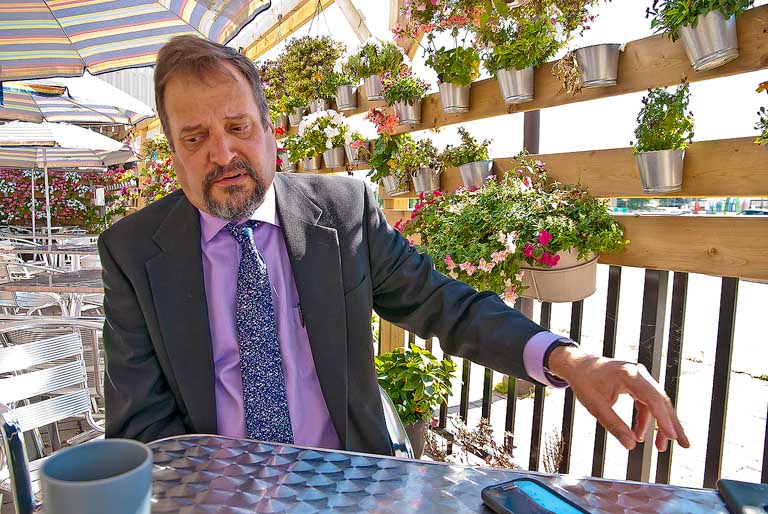
“PPC people are very angry about that because they often get busted or told to go away and some marches of similar size in similar places get a total pass – and we’re talking peaceful,” he said.
“I grew up in a police household. My father was a policeman. He was in charge of the ETF, he was in homicide, he was trained by the FBI in anti-terrorism, a very dedicated civil servant. He was proud that in 11 years when he was in charge of the ETF they didn’t shoot anybody, they always tricked them, talked them out of it, talked them down, nothing violent – well, maybe a little rough handling, but he would always say better to hit them with a stick than shoot them.”
He does think there needs to be some systemic changes regarding policing.
“The thing is there are bad cops and our first line of defense against them are good cops, who should be able to speak up and hopefully speak to their brethren. We need to screen police better, psychological screening. It’s almost if somebody wants to be a police officer, too bad, I’m a little suspicious. My dad would tell me in the ETF they would ask prospective applicants “do you like guns?” If you liked guns too much you don’t qualify. It’s a huge responsibility.”
“In our society we have given the government a monopoly on the use of force. This is an incredibly sobering responsibility and if that responsibility is not wielded properly and people lose faith and trust in that function of the state we are moving towards anarchy. When police act in an anarchic fashion, which is how I describe this behavior, it’s really bad. I don’t know the full structure of how police organizations are supervised, but I think strong civilian oversight is required, something akin to school boards – and not just handpicked commissioners. It can’t be an old buys club and I get a sense of that at federal and provincial levels. Civilian oversight is important and we need to take preventive action, not vengeful action.”
Other than the OPP, many people don’t see the proper action taken and outcomes against police officers from other forces who use their force monopoly aggressively. This seems to be the theme among people wanting change, having justice seen to be done.
“A police officer swears an oath to the Queen, not the government. They have to remember that, they are independent agents of the Crown that work for the people. Most police I meet are fine people, but I know there are bad apples. This conduct has to be dealt with and it has to be seen to be dealt with, and it should not be dealt with quietly behind the scenes. Due process of course. We don’t want outrages. I am open to a dialogue on that. Let’s go back to Sir Robert Peel’s philosophy on policing. I think there’s some wisdom there of what the role of police is in society.”
The appearance is, if you are not white, there is a separate law enforcement agenda, and of course Blacks and Natives are the obvious people on the short end of that stick. Makk thinks the solution involves other changes in society as well, like lifting people up to be equal partners in society.
“The racism accusations made by Indigenous people, that’s all front and center. That conversation is out there and it’s loud and I’m getting very frustrated with that whole reconciliation thing because talk, talk, talk and the belief that government is the solution. The PPC’s position is, fine talk, reconcile, share your emotions, but how about we actually start doing something. How about we have a project within the first mandate to make sure all reserves have clean drinking water and proper waste water treatment. We want to show some good faith here. Let’s start with something practical and let’s start at the bottom of those basic needs of life and leave those philosophical discussions to go, maybe it will go on forever,” Makk said.
“We know we can get those right. We have the best engineering capability in the world. Our military can put wells and clean drinking water in Haiti, or Africa, or wherever they go, I bet you could use the force to solve the worst cases in literally a few weeks. Let’s do it. Let’s show some good faith.”
“I also refuse to call Indigenous people something separate. They’re Canadian, they’re the original Canadians, they’re my fellow citizens and I’m pissed off there is all this trouble.”
Healthcare
Much of the discussion on healthcare was about who delivers (the feds provide a lot of funding, provinces manage) the government or business. On the latter, the great fear is privatization will lead to limited access for those who can’t pay. Makk doesn’t see it that way, it’s more about who is providing without changing who can use the service.
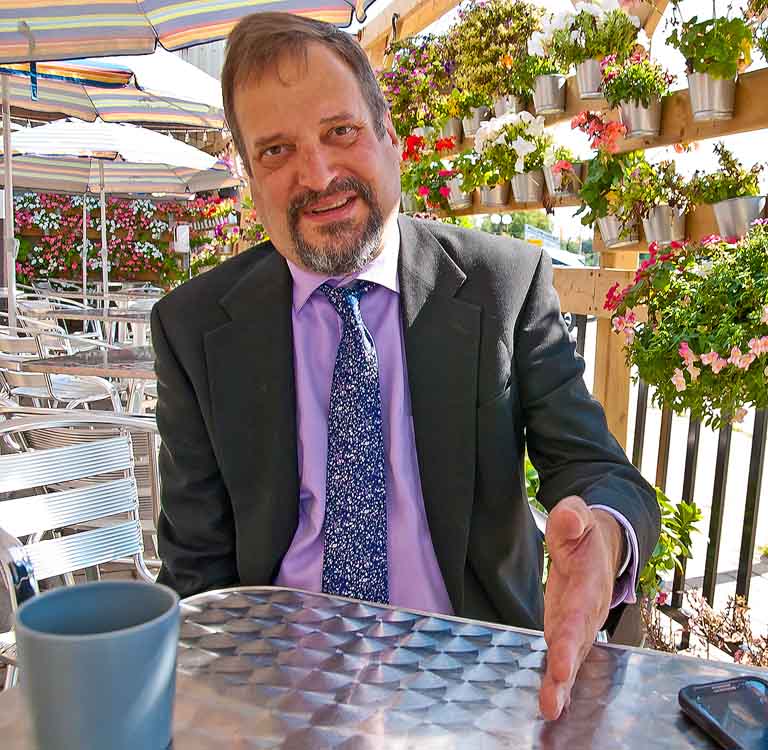
“The Canada Health Act sets universality as a condition, so that’s already in law. The PPC’s position is we don’t think the Canada Health Act is even necessary. The constitution says health care is provincial and we would propose almost, if not outright, eliminating health transfers, significantly reducing them and giving up GST points to let the provinces do the taxing for the work they have to deliver. We’re talking revenue neutral here. I think it’s wrong for the federal government to be the tax collector for the provinces,” Makk said. “I trust every province to do healthcare because they want to do healthcare right and they want to serve their constituents and if they don’t their constituents will let them know.”
The core issue is profit and the thinking is, how does introducing a component like profit make healthcare less expensive, or responsive to the patient? This is based on various attempts to introduce private insurance into the scheme, which in the U.S. has people denied procedures and sucks vast amounts of money out of healthcare spending straight into boardroom paycheques. Makk on the other hand, without specifically saying so, is focused more on the manufacturing side, instruments, medical services and goods, maybe pharmaceuticals, rather than middleman territory, insurance and access.
“I get tired of defending this tired old Marxist argument of excess profits and somehow profits are unnecessary and you can do without them. I am not against public healthcare, but I am against having a government monopoly on its delivery. I believe we don’t need to have one answer for everything. You can have more than one way of getting things done. I don’t believe having private options somehow harms the public option. If anything it might keep the public option on its toes knowing there’s a little healthy competition there. I also don’t have a problem sub-contracting specific things to private enterprise, however I don’t like these sole-source contracts, I don’t see true competition. If you are going to privatize it, it better be competitive, if it’s not competitive, it’s just more government,”
“Almost every OECD (Organization for Economic Co-operation and Development) country has parallel private/public, Europe is mostly like that and it works just fine, nobody’s dying in the streets over there. I don’t understand the argument why privatization somehow makes healthcare worse, and I don’t understand how anyone can argue how a profit motive makes the end product worse.”
Universal access is still a primary part of Makk’s view of healthcare.
“Yeah, absolutely. We’re maintaining, but we don’t agree, privatization kills universality. And when I speak privatization I don’t mean privatize the whole thing, I mean allow private solutions, sink or swim, can they make it, and if they don’t make it, oh well, that’s free market.’
“The U.S. system is no good. I would hate to be politician being asked how to fix that system because it’s neither private, nor public. It’s a mess. I’ve lived the States, like 11 years, hospitals can’t turn away anybody. They have a mandate to serve everybody and they do. How do they get the money to cover the indigent is by charging a whole lot more to those who have the means to pay,’ he said. “We don’t want to see people going bankrupt over healthcare costs.”
A dominant issue this election is abortion and it has become a central issue to three parties, including the PPC.
“The PPC has no position on abortion one way or the other. We don’t have a litmus test for candidates. Candidates can be on either side of that issue. We consider that not the business of government. I see parliament has to be a safe space for free speech. If an MP wishes to debate abortion, that’s their right and nobody should suppress that right. I personally think if somebody brought up a private members bill to do what Texas did, it’s bound to fail. I don’t see a problem with debating any topic, including abortion. I don’t like when people say science is settled, that’s wrong too. That’s not how science works. Democracy is never settled. It’s an ongoing project that goes on forever. Times change, people change. It should be debatable. I know in this riding I’m getting a lot of people asking my position on that and I guess I’m losing a bunch of votes to Christian Heritage people.”
“I find this an extremely troubling topic personally. We lost our first son, he was born really premature. It’s affected me deeply and I knew the little fellow wanted to make it into the future. I’m very troubled by abortion, I wish it didn’t happen. I find abortion horrifying and I do think it’s killing a living human being, but I don’t think it’s the business of government to get into moral questions. I also do not think God works through governments or politicians, God works directly on the soul of individuals making a decision. In the end I am a libertarian. I trust the woman and her family to decide on their own, but I don’t want this to be a hidden decision. I want to be a well thought out decision. I prefer to address the root causes of what puts a person in such despair they either don’t want to bring a child into the world because they think the world is not for them, or they feel their economic position is so dire they can’t have a child. Let’s work on that to try and eliminate that,” Makk said. “In the end, yes, I’m pro choice.”
Media
There are two parts, mainstream and social. Many Canadians don’t believe either one is working well or serves the public interest. While most of us think of the CBC being publically owned, Makk says government handouts to other organizations makes them no different.
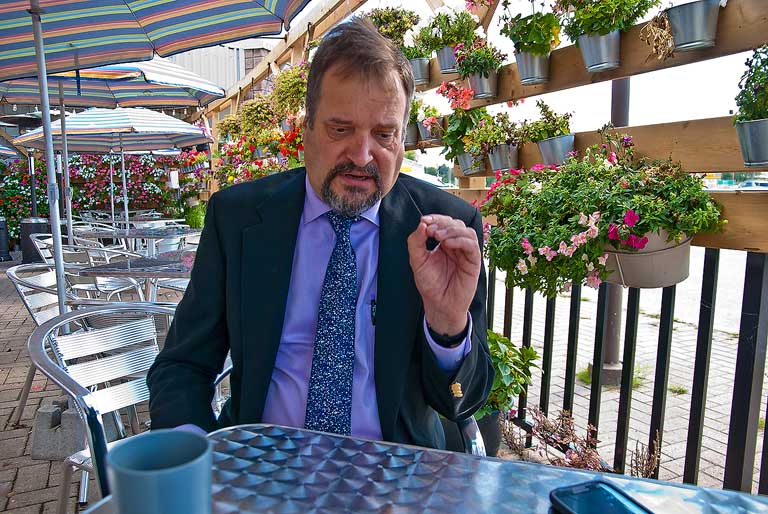
“All the major Canadian networks are government organizations in my books. I am totally against government subsidy of media. I am solidly, 100%, defund the CBC, even the National Post has taken the dole from the government. Times are changing. We don’t sell horse buggies anymore and maybe the old school, high body count, press has to evolve. That doesn’t mean there won’t be journalism; it doesn’t mean great journalists won’t have an opportunity to do their job. Concentration of ownership is bad thing. I’m totally horrified by these small town newspapers dying all the time because they are the only ones I want to read. The rest I can do online. The worst concentration of ownership is government control. Free market works for journalism as it works for everything else. And notice I say free market, not capitalism. I avoid the word capitalism because capitalism can be good, it can be bad. Crony capitalism, corporate capture of government, which happens, those are bad things. PPC is against that,” he said. Concentration of ownership isn’t just about the final product, newspapers, radio and TV broadcasts, but it’s about owning everything to do with owning the wires and air to the newsmakers.
“And they own the sports teams, and they create the content. They are getting awfully close to monopoly. The PPC is against that because that is a failure of the free market. The government does have to step in sometimes when there’s market failure.”
News content is an issue too. People are getting more distrustful of the messages because of perceived bias or outright omission or fabrication.
“I’ve given up on that. In the PPC people talk about this all the time. We are ignored. It’s not they are slandering us, or calling us something that isn’t true. It’s not about fake news. There is no news. The PPC didn’t get into the debates. We’re polling ahead of the Bloc and the Greens, yet their leaders get to be there. The press has viewed our huge rally back in April in Toronto where some have said 4 or 5,000 people; it was not on the news at all. It was a cross section of Toronto,” said Makk.
“I’m not anti- corporations doing media. I believe we left the question of left-wing bias too easily. I believe it exists. It’s driven by a few things. One is the path of education for people who become journalists tends to be through fairly woke courses and that kind of college-age exposure. Secondly, I think there’s an infotainment aspect, they want to deliver the type of things they think people want and they try to pre-judge what people want and then if the government’s pushing a certain way and they are paying I cannot believe they can’t be unbiased.”
Online is a different animal with content creators being us. There are no filters of any kind and the government tried to enact two bills, C-10 and C-36 to address the flood of misinformation and lying, but failed miserably in the details as many experts on the issue pointed out.
That censorship bill, absolutely wrong, don’t need it, and they say it’s (some of the content) legal, but hurtful and now we’re going to have to put legal remedies on it. Wait a minute; either you make it illegal, we have laws against slander, hate speech already. I think that frightens people a lot. Social media is not the real world; don’t start treating it like it’s the real world. It’s a place for amusement. Don’t go there for news, you go there for whacky opinions and you go to watch a fight. Didn’t you know those are bullying platforms, what are you expecting on there, and it’s not private.”
“This is the difference between me and hard core libertarians. Libertarians are obsessed with government censorship, government coercion; I have a much broader view. I don’t care who is doing the censoring I’m against it. If the government does it I don’t like it, a large Silicon Valley mega corporation does it – probably worse, because I trust the Canadian government more than I trust Facebook and Twitter. Certainly it should not be Rogers or Bell deciding what I get to see or not and how it’s expressed, and least of all do I want it to be a computer algorithm. When you have algorithms steering people, we are changing people’s perception of reality, we are changing their understanding of their world and what they themselves are because we are breaking the webs of trust and communication small communities have.”
Climate Change
The first action all the parties want to take on climate change is probably the one with the least effect on climate – if you don’t count changing individual behavior, which the carbon tax is intended to do. Some parties want to keep it as is, some want to increase it, others want to do away with it, and one party wants to do away with it, but keep it as is, for now.
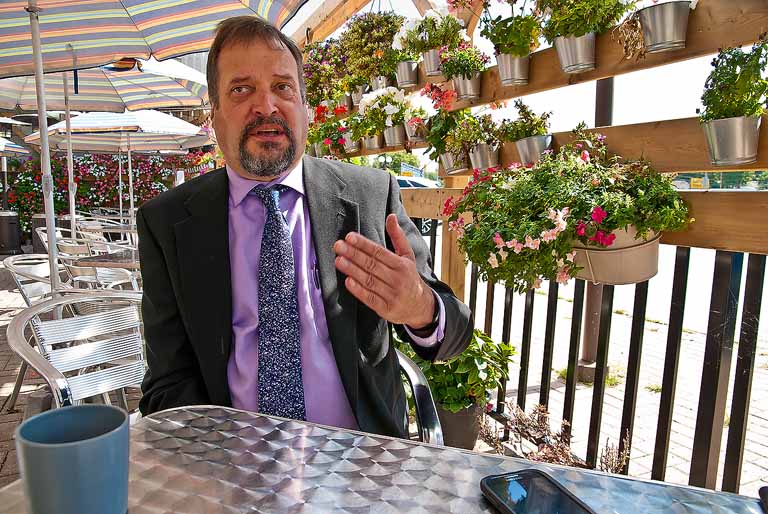
“We’re against the carbon tax because we think it’s ineffective. We had glaciers five kilometers thick right here not that long ago. Climate is always changing, it’s hard to get the data out of the noise. Climate scientists have overstated the alarm bells, they’ve been promising these hockey sticks (rates of change) and disaster. In the 70s it was the world was going to freeze and then it was going to go hot. I understand how greenhouse gasses work. I also understand climate is super complex, there may be sinks and buffers that soften the effect, or there could be tripping points; (the) Gulf Stream stopping would be huge. The models are getting better and better. I don’t think it’s a panic.”
“I am not a climate alarmist and I am not a climate change denier either. I’m in between on that and I want to concentrate on things that actually work and not just doing things to say we are doing something. A small carbon tax is literally the least you can do. The problem is harder than environmentalist oriented people say. A show-off contest of who can set a higher target is getting us nowhere. It’s like setting your thermostat to 120 when it’s 50; it’s not going to get to 60 any faster whether you set it to 65 or 120. The Paris Accord, we would get out of that. Look what China is doing, and nobody’s calling them out on that. The world organizations like the WHO and climate guys, everyone is so polite to China and Russia and India, they’re polluting like crazy, they’re building coal plants, but oh they had a little showcase windmill farm.”
“We’re chumps. If we don’t get the world to reduce its emissions, but at the same time we enter into this economic suicide pact with Western countries, this is just handing an easy victory to our rivals. I believe climate change is going to be solved by engineers and scientists, not politicians. We’ve got to get the technology. I believe we have time, I have faith we can fix it. For example, right now we could have way more nuclear. We have safe Canadian nuclear, we could have safer nuclear. We’ve got to be good engineers about it, but we don’t just say – it’s the atomic age – yes it has downsides like everything does, even windmills have downsides. We could go more nuclear in Ontario, we dealt with getting rid of coal pretty well; Germany blew it, they got rid of nuclear plants and their windmills and solar isn’t enough, do the math with their latitude and figure why solar won’t go, and now they are burning lignite again. It’s just not right.”
As with all candidates SUNonline/Orillia asked if it was time for a national effort similar to the one we undertook in World War II to advance society off of oil and into all renewable energy sources, which includes nuclear generation. To be fair, Makk may have misinterpreted the idea to mean going back to a time before internal combustion engines, but he still has some points to consider.
“I advocate we should be building our infrastructure that takes into account the effects of climate change, to harden it. In other words I’m a strong advocate of mitigation. We might not be able to control it, despite our best intentions. Accept the fact things are going to change. Let’s take that model and build our infrastructure – don’t build stuff at the seaside – if you are wrong (change happening) and you do succeed, you’ll end up with robust infrastructure,” he said.
“I don’t think its equivalent to wartime because it’s not like we’re not going to be blown to pieces if we keep using oil. We are using oil now. We’re an advanced civilization, we’re a high energy civilization, nobody wants to go back to a low energy world. Maybe a few do, but I don’t think that’s feasible. While we’re working on other solutions, we can keep using oil until those solutions are in place. Invest in these new things but it doesn’t mean you have turn off the oil right away.”
“The economy is on the edge right now due to COVID and 50 years of really bad deficit spending and money printing. We’re paying the price now. Our economy is at the edge in a lot of ways. People are feeling it. We’re seeing inflation; you go shop for food, you know what I’ m talking about. The media is downplaying inflation fears, the government is downplaying inflation fears and also this housing affordability, it’s because when you pump money into the economy by buying bonds with printed money, you pump it into the wealthy’s hands and they go – I’ve got all this money, I’ll build a house, I’ll build another house, I’ll renovate a house. We cannot throw a wrench into the economy right now, it’s not the time for experimenting.”
Future of Work
Changing an energy sector workforce to new production is a massive undertaking, which may create more employment. Training and education will have to be done.
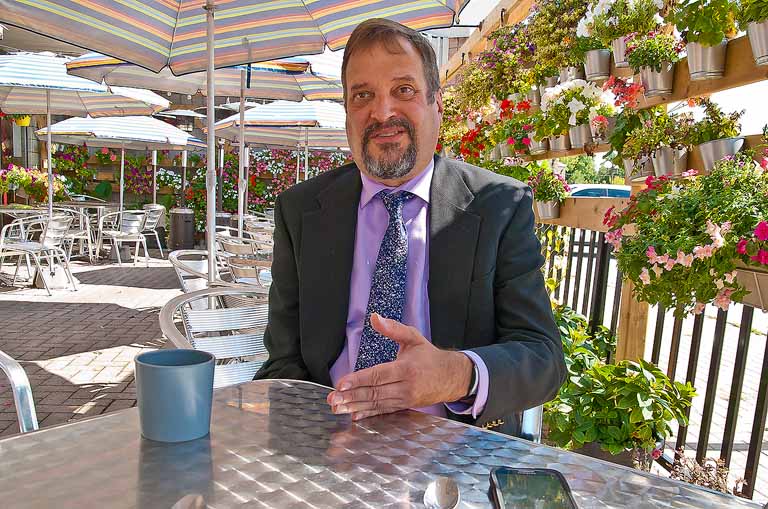
“I urge you to put yourself in the shoes of somebody at Fort McMuray and they’re looking at Trudeau saying, – oh, we’ll retrain you, we’ve got to take you and put you somewhere else. You know how bad that feels when you are talked to that way. If the free market does it, nobody’s going to be angry, but when the government says we want to make you into a call center worker Mr. Roughneck – no, this is a patronizing attitude about this. The Green’s are just saying, we don’t want to be mean, but oh yeah, green jobs. It’s a nice wish, it’s a well intended wish. I have a hard time imagining pulling it off. I do believe when the technology develops, no we don’t have places for all those oil workers now, but those places will exist in the future as we convert. It can’t be an overnight conversion. Infrastructure doesn’t change that quickly,” Makk said.
However, automation is projected to kill more jobs than we appear to be preparing for. The preparatory tool advocated by some is a Universal Basic Income, which is believed will save many from being destitute because there won’t be jobs, even low paying ones, because of automation.
“Automation has been growing since the 1700s and it hasn’t created a huge wave of unemployment yet. It may be temporary unemployment. The automobile got rid of horses; railroads are going to ruin the canals, all the canal workers are out of work now. I talk to business people, they can’t get workers. It’s because of CERB, it’s because of things like UBI. A little desperation makes people get off their butt and think differently and get more open minded. If people get it out of their heads the government is going to save them, they will be creative,” Makk said.
“I have some sympathy for a Milton Friedman style negative income tax, but I would have it at subsistence level. The purpose of it is to prevent abject poverty and deep suffering. I would not want it to become something anybody plans their life around. It’s not a replacement for productive work.”
There is a fundamental misunderstanding all opponents to UBI have that it is unemployment insurance only, when it is meant to replace all forms of social income from disability to retirement plans.
“It can eliminate a lot of redundancy in government. I like that and it’s good, but I have looked more and more into social problems the last four years because I want to be a politician. When somebody is in crisis and somebody is in trouble, or somebody is an addict, struggling, writing them a cheque is not the solution. People have to be eye to eye, hand on shoulder; compassion is the solution to the root causes of the trouble that puts people in the position they might need UBI. UBI risks being a well intentioned failure because of human nature, it’s almost like a band aid because you’ve got to drill down to give people a leg up and writing a cheque is not enough. We want government to step back, create economic room, lower taxes, let people keep their money so they can help their neighbours. I am open minded about UBI. I don’t think it has gelled enough to be a serious contender for policy and I do worry about the freeloader effect.”
China
As more news arrives about a recent major deal between a Canadian drug company and a Chinese one, people are justifiably annoyed it’s allowed to happen, given history of Chinese companies taking Canadian intellectual property and using it against us. With all the other shenanigans The Chinese government has been up to, is it time to cut the ties?
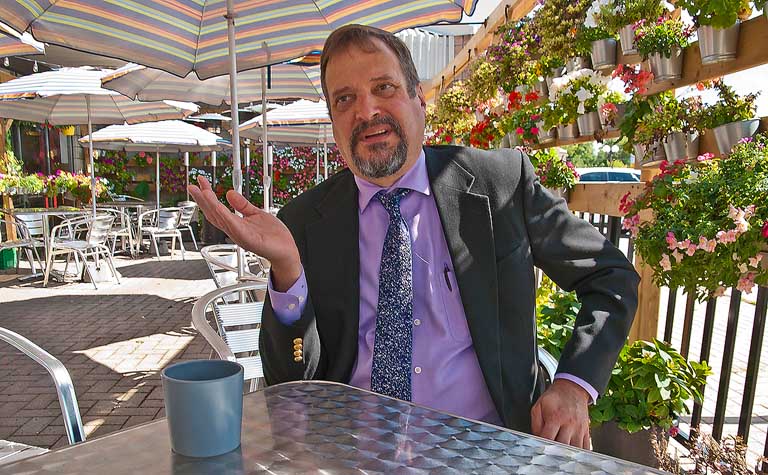
“Look what they did to Hong Kong, it’s disgusting and none of the West stood up, even verbally. If I was prime minister, I would denounce China, I would call them what they are in very careful language because the one thing they care about is saving face, and it’s really cheap to not let them save face. I don’t want it to be a shooting war or anything but when they get mad and go into a wolf warrior attitude they look like idiots around the world. I think we can provoke them to show their teeth and show what they are really all about. We hear all this crap about colonialism with Indigenous people; who is colonizing today? The Chinese are colonizing Africa, so why don’t we fight back?”
“Those (things) all have to go. Remember the CSIS leader who went public, which is not normal for a spymaster, he was saying our governments are infiltrated by Chinese operatives. Boy did he ever get it – oh you’re racist. Yes, it’s racist; you’re discriminating one group of people who are doing bad things to us from other people that aren’t doing bad things to us.”
“I know business people in China, they don’t own their brains anymore. Do not separate the people from government, that is a copout. Saying all Chinese are the same, that’s an error, but by and large the Chinese are a homogenous group acting pretty much in the same direction.”
“People love cheap stuff and China makes cheap stuff. I personally am going the other way with it. I have my own factory in Victoria Harbour. We have a lot of automation, we have a lot of workers, we build wearable technology; exported to China, Japan. I want to make widget like this (showing product), see this little buckle, nobody makes this in Canada anymore. They gave up. It’s a bad attitude. Canadians can do anything. Some places we can do better than China, I found we can do printed cardboard in Canada better than anyone. The attitude I hate is I’ll go out for requests for bid on say, these little metal parts and let a Canadian company quote and then they’re mad at me – you didn’t tell me I’m competing with China, if I’d known that, I’d just null bid.”
“I am talking with local plastics companies about making these plastic parts locally and not bringing them in from China because now you can’t get a container, the ships are slow, Burrard Inlet is backed up with ships all the way out into the Pacific. I know we are already competitive, but does any government agency want to give me a grant? Does anyone want to give me a loan to put up a factory to hire 100 people? No. The banks are calling me – are you being crippled by COVID, do you need help, do you need a bailout? No, I’m doing great, my sales doubled; can I do normal things with the bank? Well, we don’t have a program for that. Rather than trying to bail everybody out, we should make it easier for the ones who can make it happen, and that’s small business.”
The Last Word
Makk is sensitive to the housing crisis as a broad economic issue, which he brings back to why voting PPC is part of the solution regardless of where an individual’s past party support has been.
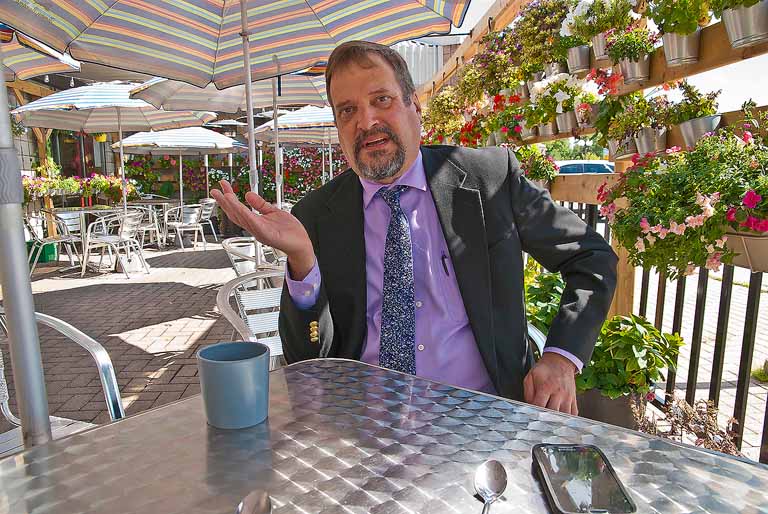
“There is no easy way out (of the housing crisis). More deficit spending and more money printing is not going to fix this. We have to turn the economy around and let the engines of the economy do their job and get processes to stabilize without government manipulation. All levels government make laws that discourage building units. I’d like to build a building in Victoria Harbour with all kinds of different income housing, but there’s barriers to it. Nobody wants to lend you money to do that. Zoning laws at the municipal level, I see progress and then the profit motive is not bad. If people can make money doing it they’re going to do more of it.”
“I’ve been in frequent contact with Bruce Stanton. We get along great. We’ve had coffee, we’ve spoken about politics. We met at various events, last election. Sometimes I was the only candidate other than him that would show up at these things. If you like the way Bruce does things, I’m your boy,” Makk said.
“We’re the real, sort of, blue guys. And furthermore, we’re the real Liberals. We believe in liberty, we’re classical liberals. My advisors say, “don’t say that because they’ll hear liberal – oh crap.” But listen to what Wilfred Laurier said, “Canadians are free. Freedom is our nationality.” What’s Trudeau say, “We have no nationality.” He’s obviously missing what makes Canada great. You take blue and red, mix them together, now you know why our colour is purple. Orange and purple is nice. We get along with the NDP great. We have a lot in common with the NDP.”
“I (also) like to remind Liberals of Chretien and the Martin government, they balanced the budget. If you are into that kind of Liberal, I’m your boy too.”
(Photos by Swartz – SUNonline/Orillia) Main: Simcoe North People’s Party of Canada candidate Stephen Makk.
Support Independent Journalism
Previous Profiles:

